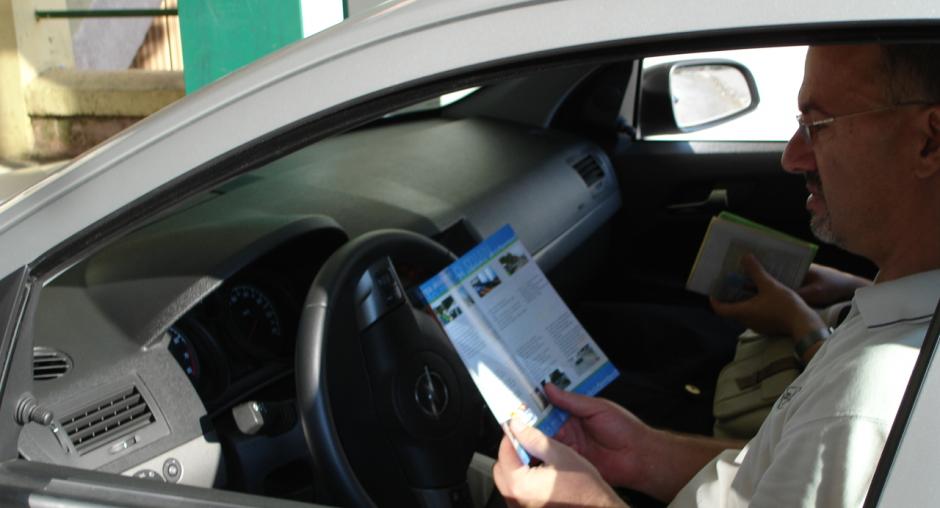OSCE Presence supports safe driving campaign in Albania
Tired drivers, many of them Albanian emigrants returning home for the summer holidays, queue under the hot August sun to enter the country at the Kakavija crossing point on the southern Albanian/Greek border. As guards check passports, they also hand drivers leaflets asking them to drive carefully and reminding them that on average 25 people die every month on Albanian roads.
The leaflet, funded by the OSCE Presence in Albania, is part of a campaign to combat a summer increase in road deaths by raising public awareness of traffic laws and improving co-operation between the police and the community. The programme, conducted in co-operation with the Ministry of Interior's Traffic Police Directorate, produced some 20,000 such leaflets, 200 posters and five billboards which were placed at important border crossing points and on major national thoroughfares.
The message the campaign conveys is simple: "Be aware of the consequences of your driving."
"This is a very good idea and I find the leaflets really useful," says Kastriot, who lives in Athens but visits his home in Gjirokastra in the south of Albania twice a year. "The message on the poster is fine, but I think a stronger message should be given: careless driving doesn't only take your life; it brings misery upon your whole family."
The leaflet provides excerpts from the Albanian traffic code, focusing on seat belts, sobriety, speed limits and overtaking.
Astrit, a father of two from Kucova, lives in a small town in Greece. "I know there are lots of accidents during the holidays. I try to be careful," he says.
As Astrit talks, his car radio reports three more casualties from road accidents involving emigrants on holiday.
A growing problem
Since the 1990s, significant social change and economic growth in Albania has fuelled rapid developments in road transport, with the number of vehicles on the road increasing significantly. During the summer, the emigrants' visits double the number of cars in circulation, says Koco Simaku, Deputy Director of the Traffic Police. The resulting rise in the number of road accidents is particularly pronounced in large cities, especially in the capital Tirana, where almost one-third of the country's population lives.
The number of deaths from road accidents has quadrupled over the last five years. The Traffic Police Directorate reported that in the first seven months of this year, more than 200 people were killed, up from 150 deaths for the same period in 2006. Injuries from road accidents are the leading cause of death among one- to 40-year-olds and represent the third-highest cause of overall mortality in the country, according to the National Institute of Statistics.
Simaku believes that the rise is due to a mix of factors including poor road conditions, inadequate driving skills and the scarcity of road signs. "Signs are either not visible or are missing, particularly in rural areas."
Klaas Los, the OSCE's Senior Police Assistance Officer in Albania, says that this is the first awareness campaign focused on a particular group - tourists visiting Albania by car.
"Statistics show us that the number of car accidents, victims and violation of traffic rules increases in the summer," Los says. "I hope that through this project, people coming to Albania will become aware of the high risk of a car accident and will drive defensively rather than aggressively."
More work needed
However, there is still work to be done to reach more visitors and ensure the effectiveness of the campaign.
The head of Muriqan border checkpoint in the northern city of Shkoder, Bashkim Coku, says that not enough people who get a copy of the leaflet actually read it. "If everyone who received it read it, the campaign would have a more significant preventive impact."
Besnik Duka, the team leader on duty at the Morini border checkpoint in Kukes, makes another point: "The campaign is useful, but if it had started earlier in the year rather than in mid-July the impact would have been greater."
Nonetheless, the OSCE's Los says that the Presence is committed to continuing its assistance to the Albanian police.
"We are ready to further our co-operation with the Traffic Police and assist them and the community with their challenge to prevent road accidents and make driving in Albania safer," he says.

